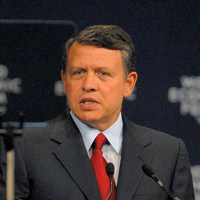In responding to the growing security crisis emanating from Syria, Jordan finds itself caught between the positions of the United States and the Gulf Cooperation Council (GCC), with the U.S. insisting on restraint and gradualism in Syria and the six-member GCC pushing hard to tip the military balance against Syrian President Bashar al-Assad. Jordan’s King Abdullah must negotiate these competing forces to manage what he sees as an imminent threat in Syria.
Seen from Jordan’s perspective, that threat can be explained in terms of three concentric rings of security. The first ring is the growing influx of Syrian refugees, who now number more than 460,000 and cost Jordan some $500 million a year. Jordan sees the refugees not simply as an economic burden that will aggravate the kingdom’s unemployment, inflation, and water and fuel shortages, but also as a serious security problem. This anxiety is shaped in part by Amman’s concern that Jordan’s demographic balance may tilt in favor of the country’s large populations of long-term refugees, namely Palestinians, present in Jordan since 1948, and Iraqis, who have sought refuge since the 1991 Gulf War. In addition, Jordan’s apprehension about Syrian refugees is driven by an acute sense of vulnerability to terrorism.
The record of the past decade validates this fear, especially in the context of escalating sectarian violence in neighboring Iraq. Economically precarious refugees can be susceptible to the message and recruiting activities of jihadi groups such as those active in Syria and Iraq. Moreover, Jordan has already suffered serious terrorist attacks, including an incident in 2005, when Jordanian, Syrian and Iraqi elements linked to al-Qaida in Iraq launched rocket attacks on U.S. warships docked in Aqaba Bay, and another one four months later, when a bombing by Iraqi nationals of three hotels in Amman killed 60 people.

